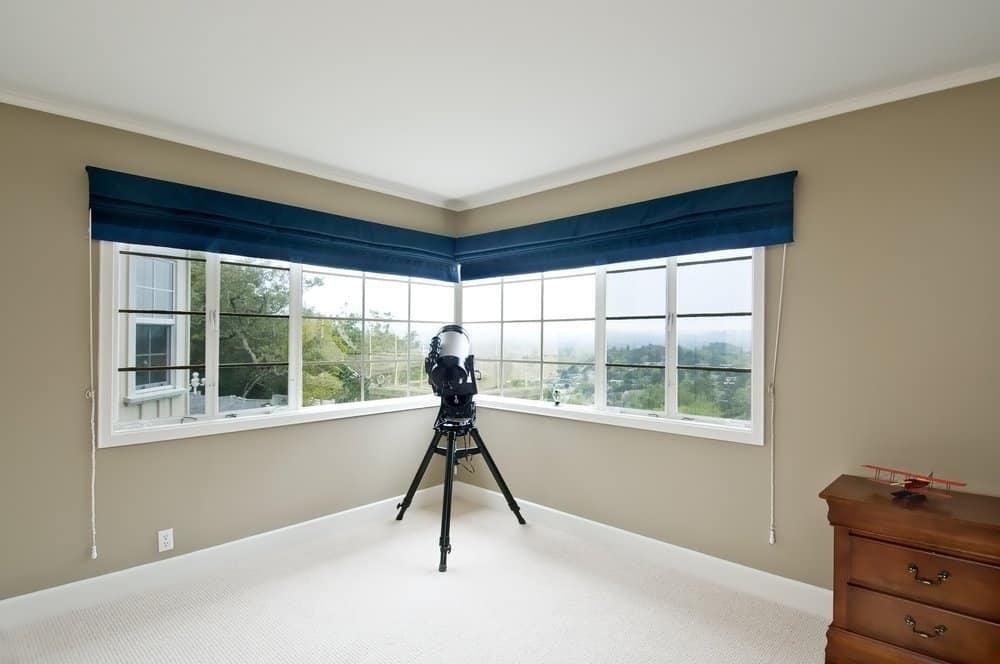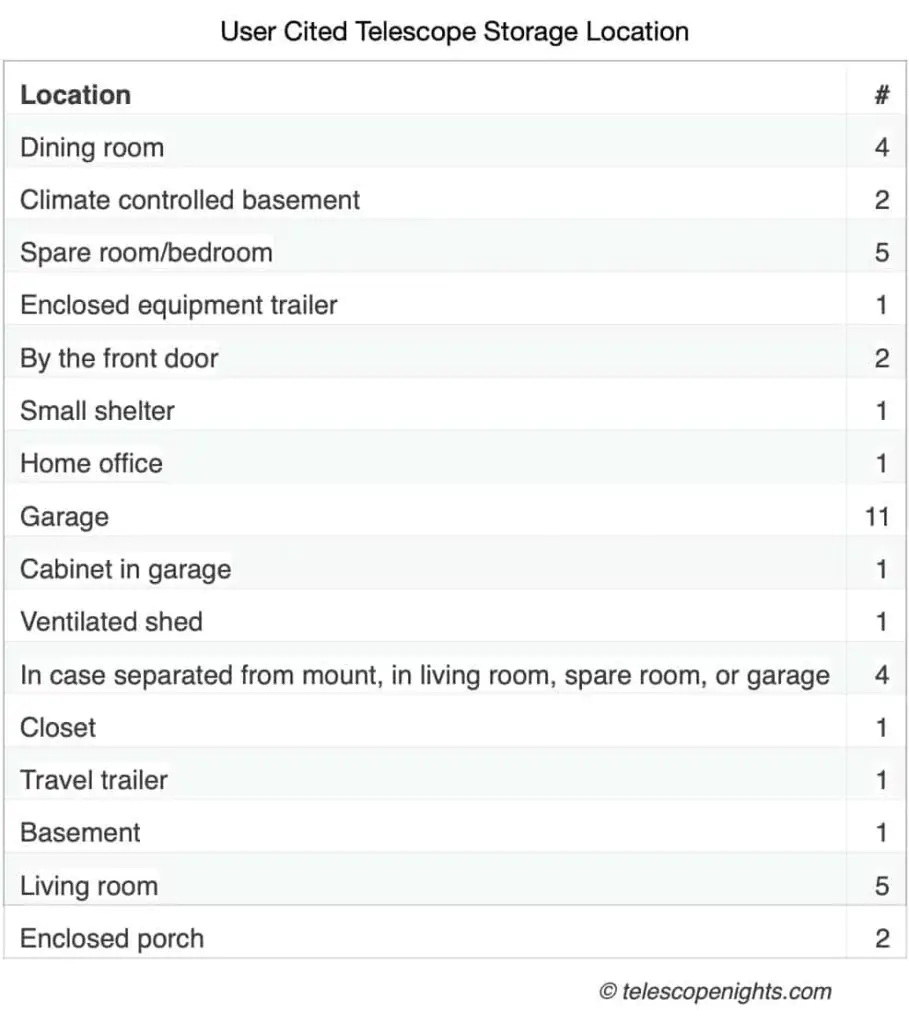If you’re looking to buy or already have one, you might be wondering ‘Where should I store my telescope?’ Here I cover storage ins and outs, what to avoid, and the best options to consider when looking to store your telescope tube and optics.
Where should you store your telescope? It’s best to store your telescope in a dry and dust-free location away from direct sunlight and where ambient temperatures fluctuate little, i.e. no sudden marked changes in temperatures. Room temperature is fine within your home in a spare room or bedroom, with limited dust and humidity.
This is somewhat of a controlled environment.
I have mine stored in the corner of a living area. Some people have their telescopes stored in garages, bedrooms, or lofts. If it is small enough, it may sit on a table or stand of some sort. Size is a driving factor for people when it comes to choosing storage space. But, one other main thing to consider is whether the temperature within your chosen area will likely fluctuate greatly and good insulation will be the answer here to avoiding this. I talk more about why it is important, further down.
So choosing storage space will depend on the type and size of your telescope. Smaller more portable scopes often come with a backpack or case and so it could be just a matter of storing the telescope in its bag in your closet. These are usually compact, unlike a Dobsonian, for example.

The best telescope storage ideas
First: How big is your telescope? How much room do you need?
A 6″ or larger Dobsonian, for example, will require more space than most store-bought hobby refractors or a small reflecting telescope. It would take up the corner of a room.
Next: What to look for in a space for storing your telescope:
- Low humidity – no dampness
- Well insulated from marked temperature change
- No direct sunlight
- Not overly heated
- Dust-free as much as possible
- Creepy crawly insect and pest free
- Unencumbered – Away from accidental knocks and bumps
I think most would agree that a telescope with a tripod can be stored with the telescope sitting on the tripod, rather than dismantling them every time for storage. This is of course providing it is a decent size and not a portable one where the tripod is better folded and stored with the tube in its case.
Telescope storage humidity
Humidity can be a problem with storing telescopes in some places.
Humid conditions promote growth of fungi and mold. This is not something you want invading your telescope optics.
For this reason, avoid storing your telescope in areas that are moist or damp or where condensation will form.
Telescope storing and heat
Heat can harm the lens and inner workings of the telescope. So, places that get overly heated (e.g. heavily sunlit areas, poorly insulated sheds or garages in tropical locations, and heated rooms) are not ideal for storing your telescope.
Telescope storing and temperature fluctuations
Sharp fluctuations in temperature can cause condensation and so it’s not a good idea to store your telescope in places that are not insulated against this. There are two main reasons for this.
One, condensation creates dampness, which promotes the growth of mold, a real nuisance in your telescope as it is difficult to completely remove.
Two, condensation forming and then drying on the lens or mirror will leave a residue, which will interfere with your viewing satisfaction and add to the telescope cleaning regime.
Tip: You could try storing silica gel desiccant with the telescope to absorb any moisture to deal with condensation problems.
Modern homes generally have insulation installed in the walls and roof, including in that of the garages. This helps avoid marked temperature changes. Sheds however are typically not insulated.
Where do people store their telescopes?
I checked out what other backyard enthusiasts do and here is a list of telescope storage options that you might find useful for ideas on how to store your telescopes.
Better temperature control, far less dust, and less humidity were the main reasons mentioned for storing telescopes inside the house and are considered important overall.
Convenience, that is, easy access to telescope use, was often mentioned as the reason for storing telescopes in the garage. Some of these telescopes were large as well, as in 20″ Dobsonians.

The garage was a fairly common storage spot among the options given by more than 40 amateur astronomers. A few telescopes, even as big as a 12″ reflector, were stored in cases separated from the mount/tripod, but most were stored attached to their tripods. One even stated how, for over 20 years, they’ve stored their 8″ SCT this way on a tripod in the house ready for use.
Storing telescope in garage or shed
You might consider a good spot for your telescope to be in your garage or shed. Just make sure it is insulated against dampness and excessive heat forming. The same holds true for basements, closets, or other storage areas where you intend to store your instrument.
Dust and mold settling on or in your instrument can play havoc with the glass surface and mechanism of eyepieces and the reflective surface of primary and secondary mirrors or lenses.
So, it’s best to avoid dusty, humid, or heavily sunlit spots as these can create issues that will reduce your enjoyment and the satisfactory performance of your telescope long-term.
The last thing you want is more cleaning, recalibrating, or fixing your telescope than you need before you get to see a half-decent view of Moon on a good night for stargazing. Or, having far from perfect optics when it’s your best chance to see Saturn, Jupiter, or Mars through your telescope.
See also: My guide to the best planet-viewing telescope
Leaving telescope Outside
Can you store a telescope outside? Well yes, you can store a telescope anywhere, including outside. It may be convenient. But the marked temperature changes and any direct sunlight will harm the optics and tube.
So if you’re wondering “Is it okay to leave a telescope outside?” then no, not if you want your telescope to perform at its best and have it useable for any reasonable amount of time.
Here’s the thing…
Leaving your telescope exposed to the elements will see nature wreak havoc upon it. It will likely get ruined – and much sooner than if you’d stored it away.
Direct sunlight and moisture problems are at least two of the issues you’ll face with leaving your telescope outside in the elements. If it doesn’t rain or collect morning dew, a change in overnight temperatures outside will mean condensation and subsequently, moisture collecting in your instrument. Heat, from direct sunlight, is another factor that can harm the lenses.
Then there’s the dust and particles blown by the wind, that are likely to enter the telescope’s workings if left outside.
How do I properly store my telescope?
It is best to store your telescope away from the external elements between each viewing session. That is, don’t leave it outside in between.
Here are some tips…
- If you happen to be viewing with cold night air (or hot night), allow the telescope some time to adjust to the inside temperature, i.e. acclimatize, after your observing session once you’ve brought it inside. By the way, leaving your telescope outside for easy access the next night is one of those telescope storage mistakes.
- Cover the lens/es and the tube with the caps provided by the manufacturer. These are designed to stop dust and insects from getting in and damaging the telescope optics or fouling the tube.
- Ideal storage conditions: An unencumbered space (meaning away from the likelihood of accidental damage from visitors, pets, or kids, knocking the instrument), room temperature is best, no extreme temperature changes, low humidity, a dust-free environment, and no direct sunlight.
- Store the optical tube and telescope mount/tripod separately if size allows. Depending on the size of your scope it may be stored in a closet, for example, horizontally or vertically.
- Protect the scope from dust, dirt, and vibration. You might have a dust sheet or a cover or case that came with the product. Especially if you are on the move or there’s likely to be some vibration in the storage area, look at storing the tube and optic in a case with foam protection.
How to acclimatize your telescope
This means putting off covering the optics or the telescope tube or tripod for an amount of time needed to bring the telescope to room temperature. This will allow any moisture from dew or condensation formed because of the cold night air to evaporate so you can safely store it without concern of mold or distortion of the lenses occurring.
More helpful tips on storing your telescope
Having the tube oriented vertically or horizontally is considered the best as it reduces the force of the mirror’s weight on the focusing component. You want the least long-term stress on the focusing mechanism to avoid focusing problems from damage over time.
How to protect your telescope from dust
Covers and dust caps are important. Keep and use the dust covers that come with the instrument and the accessories. Otherwise, you might need to look at buying extras. Finally, follow the above tips.

Orion Telescope Cover
available at Amazon (affiliate link)
In closing
For the reasons mentioned above, it’s best to inspect the spaces where you intend to store your telescope for potential issues of dust, mold, direct sunlight, as well as temperature range. It’s probably a good idea to consider where you are going to store your telescope before purchasing it.

